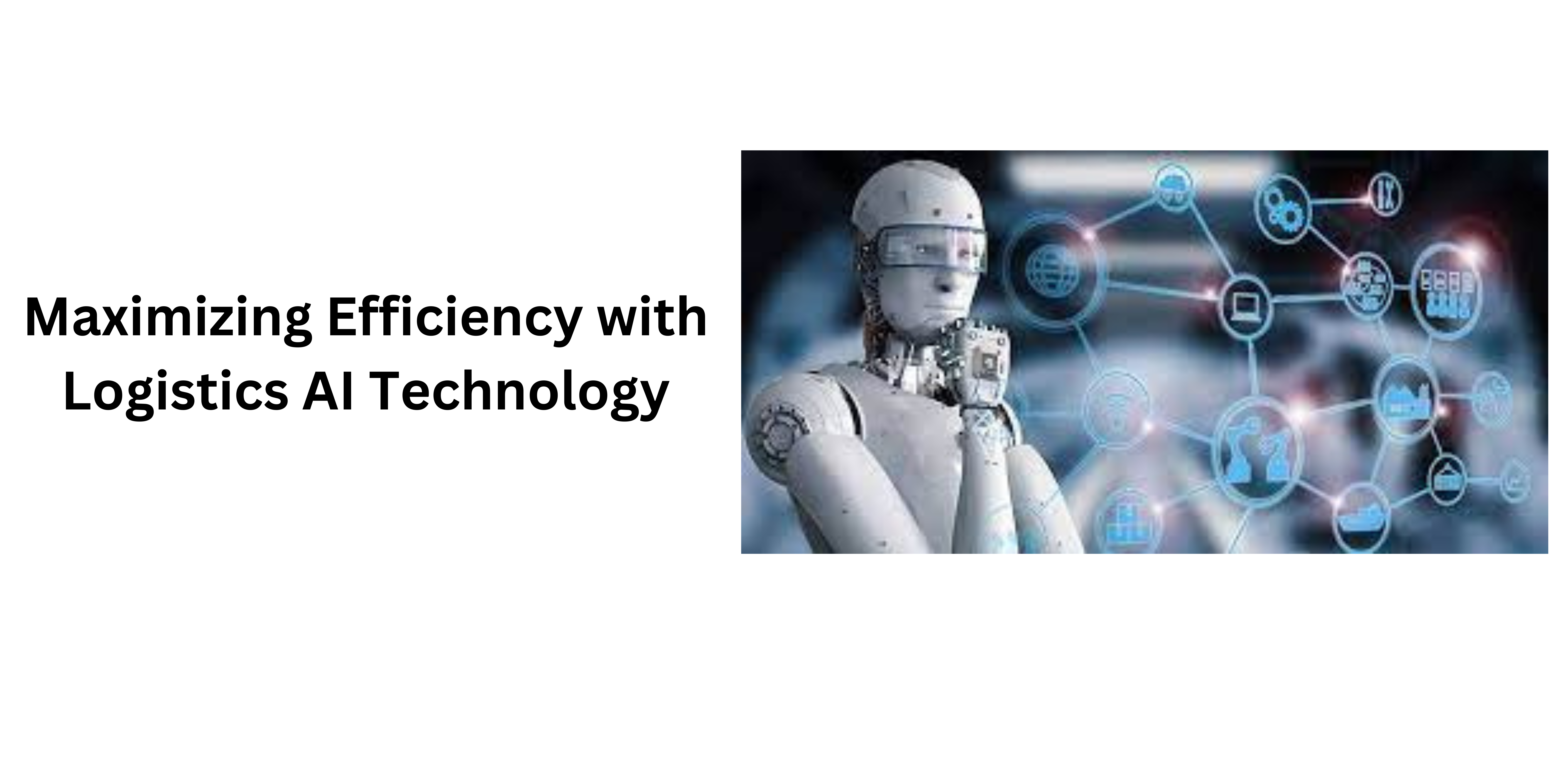In the current world of fast-paced economic growth, businesses constantly need to improve the supply chain process to stay competitive. Efficiency is the key to the success of businesses, and technologies like Logistics AI Software are revolutionizing how businesses manage their logistics. This article outlines the crucial function of Logistics AI Technology in enhancing efficiency and streamlining the management of supply chains.
Logistics AI Software encompasses a variety of advanced algorithms and machine-learning capabilities that can analyze massive quantities of information, forecast demand, optimize routes, and simplify inventory management. Utilizing the potential of artificial intelligence, businesses can gain more insight into their logistics systems to identify bottlenecks and anticipate disruptions.
One of the main advantages of Logistics AI Technology is its capability to evolve and adapt in real-time. Traditional logistics systems typically use static models that cannot keep up with changing markets and unexpected situations. Contrary to this, AI-driven systems constantly learn from the latest data inputs, enabling businesses to make informed decisions with unparalleled speed and precision.
Additionally, Logistics AI Software empowers businesses to automate repetitive tasks and minimize human error, allowing precious resources to concentrate on strategic projects. For everything from route planning to predictive maintenance, AI-driven algorithms can spot ways to reduce costs and improve performance throughout the supply chain.
As the need for speedier delivery times and better customer experience continues to grow, Logistics AI Technology has become a key factor in achieving operational excellence. Through the use of advanced analytical and predictive capabilities, businesses can cut down on lead times, improve the amount of inventory they have, and provide greater quality to customers.
How to Start Logistics AI Software Development?
This complete guide will explain the important steps needed to begin the path to Logistics AI Software Development.
Understanding Logistics AI Software Development
Logistics AI Software Development involves the use of AI-based techniques such as machine learning natural language processing as well as predictive analytics, to boost logistics operations. From routing optimization to forecasting demand AI-powered software solutions are able to change the way that logistics companies work.
Identifying Use Cases and Challenges
Before diving into development, it is essential to pinpoint specific use cases and issues in the logistics field. If it’s managing inventory or fleet optimization, or visibility into supply chain and identifying areas in which AI can be beneficial is essential.
Gathering Domain Knowledge
Logistics AI Software Development demands an in-depth knowledge of logistics processes as well as AI technology. Developers should work closely with experts in the domain to understand the complexities of the field and create AI solutions to meet the unique needs of the industry.
Data Collection and Preprocessing
Data is the bloodline in AI algorithms. In the field of logistics, massive quantities of data are generated by different sources, including GPS trackers, sensors transactions, and other records. Developers need to collect, cleanse, and process the data in order to ensure its accuracy and its relevance to training AI models.
Choosing the Right AI Techniques
Logistics AI Software Development encompasses many different AI methods, each one suited to different goals and tasks. From supervised learning to solve task classification to reinforced learning for optimization challenges and deciding on the most appropriate AI methods is crucial to successful implementation.
Developing Prototypes and MVPs
Iterative development is the key in refining AI-powered logistics solutions. The developers should start by developing models and minimum Viable Products (MVPs) in order to verify concepts, collect feedback and then iterate on the real-world experience.
Integration with existing Systems
A seamless integration to existing systems for logistics is vital for the success in AI applications. Developers need to ensure compatibility and interoperability older systems, while using middleware and APIs for seamless data exchange.
Ensuring Scalability and Performance
Logistics operations are distinguished by complexity and scale. This is why logistics AI software has to be designed with performance and scalability in the forefront. Utilizing distributed computing frameworks and cloud infrastructure can aid in scalability while optimizing algorithms to improve efficiency boosts efficiency.
Addressing Security and Privacy Concerns
In this day and age of cyber and data security threats, privacy and security are the most important considerations when it comes to logistical AI Software development. Implementing secure encryption as well as access control and conformity with data protection laws are essential elements of the design process.
Continuous Monitoring and Maintenance
The process to Logistics AI Software Development does not stop with the deployment. Monitoring and maintenance on a regular basis are vital to ensure the accuracy of accuracy, precision, and the relevance of AI models in the long run. The monitoring of performance indicators, identifying anomalies and re-creating models with new information and data are all ongoing activities in the lifecycle of logistical AI software.
Embracing Ethical and Responsible AI Practices
As AI technology advances ethics considerations are becoming more important. Developers must adhere to the principles of transparency, fairness, and accountability through the entire development process. proactive measures to reduce biases, clarify AI decision-making, as well as seek feedback from users build confidence and trust in the AI-driven solutions to logistics.
Exploring the Key Features of Logistics AI Software Development
The main aspects in the logistics AI software, explaining its impact on the business.
Predictive Analytics
Predictive analytics is the key element in logistics AI software. Through analysis of the past, trends in markets and external forces These systems predict the demand, anticipate disruptions that could occur and help optimize the level of inventory. Predictive models allow logistics professionals to anticipate problems, limit stockouts and ensure optimal stock levels, thereby increasing efficiency of operations and decreasing expenses.
Route Optimization
Route optimization algorithms integrated into logistics AI software automatically calculate which routes are most effective for automobiles, considering things like the patterns of traffic, weather and delivery times. By reducing the time required to travel and the amount of fuel consumed routing optimization capabilities greatly improve the efficiency of fleets and reduce costs for transportation and increase on-time delivery performance.
Real-time Tracking and Monitoring
Monitoring and tracking capabilities that are real-time enable logistics professionals to track the movement of goods across all stages of the supply chain. Making use of GPS technology as well as IoT sensors Logistics AI software offers information on the status of your shipment, its the location and the condition of the shipment. This feature permits the proactive intervention when there are deviations from the planned route as well as ensuring prompt delivery and improving customer satisfaction.
Warehouse Automation
Warehouse automation is revolutionizing conventional logistics by leveraging AI-driven robotics, automated guide vehicles (AGVs) as well as smart system for managing inventory. Logistics AI software manages warehouse processes such as packing, picking and sorting, with a remarkable level of accuracy and efficiency. Through automation of tedious tasks as well as optimizing storage space usage Warehouse automation tools optimize operations, eliminate errors and speed up the process of fulfilling orders.
Demand Forecasting and Inventory Optimization
Demand forecasting algorithms integrated into logistics AI software analyse the historical sales data, market trends and seasonal variations in order to predict the future demand patterns with precision. By optimizing the levels of inventory as well as replenishment methods, the functions ensure that stockouts are not overstocked decrease carrying costs and increase the turnover of inventory. Real-time synchronization of inventory levels and demand forecasts assures the best stock availability while minimizing costs for holding.
Cognitive Customer Service
Cognitive customer service features within logistics AI software improve satisfaction and engagement of customers through chatbots and intelligent virtual assistants. These AI-powered interfaces enable seamless communication, respond to customers’ questions, and provide live updates on status of the shipment and delivery times. Through providing 24/7 personalized support Cognitive customer service capabilities enhance the overall customer experience and increase customer loyalty.
Risk Management and Mitigation
Logistics AI software integrates risk management tools that evaluate and reduce the risk associated disruptions in supply chains as well as geopolitical and regulatory changes. Through the analysis of vast data sets and generating scenarios for various scenarios these tools allow for proactive risk detection and planning for contingency. Improved risk visibility allows logisticians to take proactive measures to prevent disruptions in operations, and protect business continuity.
Integration and Scalability
Integration and scalability are key elements of logistical AI technology development. This is by providing seamless integration with existing enterprise systems, and the ability to expand to meet the changing requirements of business. The software solutions are integrated seamlessly with ERP (ERP) systems and transport management software (TMS) as well as Warehouse management software (WMS) which facilitate the exchange of data and automating processes throughout the supply chain. The ability to scale architecture allows organizations to grow their operations, cope with the increasing volume of transactions and change market conditions with little disruption.
Conclusion
the introduction with Logistics AI Technology marks a significant step in the advancement in supply chain administration. Utilizing the potential of artificial intelligence, businesses can improve their efficiency as well as optimize their allocation of resources and ultimately improve efficiency in the logistics process. Utilizing AI-powered solutions allows for real-time decision-making predictive analytics, predictive analytics, as well as flexible response mechanisms that are essential in today’s fast-paced business environment.
Businesses are striving to stay ahead of the curve and meet increasing demands from clients the need to invest to invest in Logistics AI Software Development Company is essential. These companies are experts in the development of customized AI solutions that meet the particular requirements and issues in logistics operation. By advancing improvement as well as collaboration with other companies, they allow businesses to take advantage of modern technology and stay ahead of technological advancements.
Additionally, the benefits associated with Logistics AI extend beyond operational efficiency. It can provide better customer experiences lower costs, improved sustainability, and a higher degree of capacity. Automating repetitive tasks, optimizing routes and reducing risks, AI technology enables logistics professionals to concentrate on strategic projects and activities that add value.




